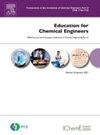Energy under debate: Fostering critical thinking in chemical engineering through in-class debates
IF 2.3
2区 教育学
Q1 EDUCATION, SCIENTIFIC DISCIPLINES
引用次数: 0
Abstract
This paper examines the use of in-class debates as a collaborative learning technique in the teaching of Chemical Engineering, as part of a third-year course in the Chemistry degree. "The aim is to evaluate its effectiveness in developing critical thinking and argumentative skills, while promoting awareness of sustainable energy aligned with the United Nations' Sustainable Development Goal (SDG) 7, which aims to ensure access to affordable, reliable, sustainable, and modern energy for all (United Nations, 2015). Over two academic years (2022–2024), students participated in debates on various energy sources, including nuclear, wind, solar or tidal energy, among others. The debates encouraged students to engage with diverse perspectives, apply their theoretical knowledge, and defend positions contrary to their own beliefs. Surveys were conducted before and after the debates to assess changes in student opinions on the viability of different energy types. Post-debate surveys revealed significant shifts in perception, such as a 0.8-point increase in favourability towards tidal energy in the 2023–2024 cohort. Additionally, 88 % of students reported finding the debates engaging, and 87 % felt the activity improved their understanding of energy topics. To further assess the development of critical skills fostered by the debates, a rubric was designed and applied by the professor, focusing on areas such as argument clarity, use of evidence, and teamwork. This rubric provided valuable insights into students' skill progression throughout the activity, offering an objective perspective on the effectiveness of debate-based learning without impacting students' final grades.
辩论中的能量:通过课堂辩论培养化学工程的批判性思维
本文探讨了课堂辩论作为一种协作学习技术在化学工程教学中的应用,作为化学学位三年级课程的一部分。其目的是评估其在培养批判性思维和辩论能力方面的有效性,同时根据联合国可持续发展目标(SDG) 7促进可持续能源意识,该目标旨在确保所有人都能获得负担得起的、可靠的、可持续的现代能源(联合国,2015年)。在两个学年(2022-2024)中,学生们参加了关于各种能源的辩论,包括核能、风能、太阳能或潮汐能等。辩论鼓励学生参与不同的观点,运用他们的理论知识,捍卫与自己的信仰相反的立场。在辩论前后进行了调查,以评估学生对不同能源类型可行性的看法的变化。辩论后的调查显示,人们的看法发生了重大变化,比如在2023-2024年的队列中,对潮汐能的好感度增加了0.8个百分点。此外,88% %的学生报告说他们发现辩论很有趣,87% %的学生认为这项活动提高了他们对能源主题的理解。为了进一步评估辩论中培养的关键技能的发展,教授设计并应用了一个标准,重点关注论点的清晰度、证据的使用和团队合作等方面。这个标题在整个活动中为学生的技能进步提供了有价值的见解,在不影响学生最终成绩的情况下,为辩论式学习的有效性提供了一个客观的视角。
本文章由计算机程序翻译,如有差异,请以英文原文为准。
求助全文
约1分钟内获得全文
求助全文
来源期刊

Education for Chemical Engineers
Multiple-
CiteScore
8.80
自引率
17.90%
发文量
30
审稿时长
31 days
期刊介绍:
Education for Chemical Engineers was launched in 2006 with a remit to publisheducation research papers, resource reviews and teaching and learning notes. ECE is targeted at chemical engineering academics and educators, discussing the ongoingchanges and development in chemical engineering education. This international title publishes papers from around the world, creating a global network of chemical engineering academics. Papers demonstrating how educational research results can be applied to chemical engineering education are particularly welcome, as are the accounts of research work that brings new perspectives to established principles, highlighting unsolved problems or indicating direction for future research relevant to chemical engineering education. Core topic areas: -Assessment- Accreditation- Curriculum development and transformation- Design- Diversity- Distance education-- E-learning Entrepreneurship programs- Industry-academic linkages- Benchmarking- Lifelong learning- Multidisciplinary programs- Outreach from kindergarten to high school programs- Student recruitment and retention and transition programs- New technology- Problem-based learning- Social responsibility and professionalism- Teamwork- Web-based learning
 求助内容:
求助内容: 应助结果提醒方式:
应助结果提醒方式:


